Strategic Thought Transformation - The IIPM Think Tank
Strategic Thought Transformation - The IIPM Think Tank
Strategic Thought Transformation - The IIPM Think Tank
You also want an ePaper? Increase the reach of your titles
YUMPU automatically turns print PDFs into web optimized ePapers that Google loves.
S T R A T E G I C I N S I G H T<br />
agement unable to maintain security.<br />
<strong>The</strong>se estimates are substantial, but<br />
more than anything, they indicate two<br />
important facts:<br />
1. Industrial espionage is a serious problem<br />
and by professionals is recognized as<br />
being such,<br />
2. It is very difficult to determine what the<br />
actual damage is.<br />
Who is responsible In some cases,<br />
these losses are the result of activities by<br />
governments, in other cases, the result of<br />
activities by competitors, or by state-sponsored<br />
organizations.<br />
1. <strong>The</strong> World’s Second Oldest<br />
Profession<br />
Countries long have recognized the dangers<br />
of trade secrets escaping to other countries.<br />
Jeremy [10] reviews the history of 18th<br />
Century Britain where it was illegal for a<br />
skilled person to exit the country:<br />
“In the early 1780s no skilled artisan<br />
or manufacturer was legally free to leave<br />
Britain or Ireland and enter any foreign<br />
country outside the Crown’s dominions for<br />
the purpose of carrying on his trade. ... It<br />
became illegal to export or to prepare to<br />
export... any pre-industrial or industrial<br />
textile, metal-working, clock-making,<br />
leather-working, paper-making or glass<br />
manufacturing equipment.”<br />
It may well be that some of the earliest<br />
industrial espionage had its origins in the<br />
United States, during its earliest years after<br />
gaining independence from the British<br />
Crown. According to Cooke [4], Alexander<br />
Hamilton (1755-1804), a delegate to the<br />
U.S. Constitutional Convention, and the first<br />
Secretary of the Treasury, was an earlier<br />
supporter of activities to “encourage” manufacturing.<br />
“To Hamilton ... the encouragement<br />
of manufactures was a prerequisite of<br />
national security and defense.”<br />
Hamilton was the author of the famous<br />
Report on Manufactures that was<br />
submitted to Congress on December 5th,<br />
1791. 4 <strong>The</strong> Report is an extensive analysis<br />
of the balance of power in manufacturing<br />
Industrial<br />
espionage also<br />
leads to wide-scale<br />
counterfeiting of<br />
products,<br />
particularly related<br />
to ones in IT<br />
between the United States and Europe.<br />
Hamilton argued for a wide variety of<br />
measures to encourage business, including<br />
the acceleration of ways in which U.S.<br />
companies could acquire the technologies<br />
found overseas, and he argued that the U.S.<br />
Congress should work to provide incentives<br />
for development of industry across the U.S.<br />
landscape. Even though some of the earliest<br />
industrial espionage on record originated<br />
from the United States, the practice has<br />
by no means passed away. Instead, there<br />
appears to be today a regular stream of<br />
U.S. industrial espionage, some of which it<br />
is argued is supported by the U.S. government.<br />
<strong>The</strong>se include: 5<br />
1. Supposedly U.S. intelligence agents were<br />
forced to leave France after stealing<br />
various “economic and political secrets”.<br />
2. At the U.S.-Japan automobile trade<br />
talks in Geneva in 1995, there was<br />
eavesdropping on the Japanese delegation.<br />
3. It has been charged that the EU Parliament<br />
and Commission email has been<br />
hacked into [by U.S. operatives] in order<br />
to collect information during the<br />
GATT [trade] negotiations.<br />
A review of how the U.S. Intelligence<br />
Community has helped in conducting economic<br />
espionage is found in Clark [3]. According<br />
to Wright & Roy [17],<br />
“Industrial espionage has different<br />
names: corporate espionage, economic<br />
espionage, industrial intelligence.” 6<br />
What is the difference between “espionage”<br />
and “industrial espionage” According<br />
to Answers.com, they are quite<br />
different: “Espionage. <strong>The</strong> act of obtaining<br />
information clandestinely. <strong>The</strong> term<br />
applies particularly to the act of collecting<br />
military, industrial, and political data<br />
about one nation for the benefit of another.<br />
Industrial espionage—the theft of patents<br />
and processes from business firms—is not<br />
properly espionage at all.”<br />
1.1 What is its definition<br />
“Industrial espionage . Espionage conducted<br />
for commercial purposes instead<br />
of the usual national security purposes. It<br />
is conducted both by governments and by<br />
private organisations. At the most innocuous<br />
level, the term is applied to the legal<br />
and mundane methods of examining corporate<br />
publications, web sites, patent filings,<br />
and the like to determine the activities of<br />
a corporation (though this is normally referred<br />
to as business intelligence), through<br />
to bribery, blackmail, technological surveillance<br />
and even occasional violence.<br />
As well as spying on commercial organisations,<br />
governments can also be targets<br />
of commercial espionage— for example,<br />
to determine the terms of a tender for a<br />
government contract so that another tenderer<br />
can under-bid.”<br />
<strong>The</strong> critical difference appears to be<br />
the type of information that is being obtained<br />
and the type of organization that is<br />
obtaining it or is the ultimate consumer.<br />
Governments can commit industrial espionage<br />
against enterprises in other countries,<br />
and foreign corporations can do the same.<br />
Industrial espionage also leads to wide-scale<br />
counterfeiting of products, particularly information<br />
technology. According to Morrison<br />
[11], as much as $100bn is lost annually by<br />
IT companies due to fake products. 7<br />
4<br />
For an analysis of the policies in Hamilton’s report, see Irwin [9].<br />
5<br />
This information is reported by Van Arnam [16].<br />
6<br />
<strong>The</strong>y quote the definition of Industrial Espionage given by the Canadian Security Intelligence service: [Economic Espionage is any action] ... “which can be described as illegal, clandestine<br />
or coercive ... by a foreign government in order to gain unauthorized access to economic intelligence, such as proprietary information or technology, for economic advantage.”<br />
7<br />
<strong>The</strong> estimate was based on survey of 15 leading IT companies. <strong>The</strong> survey was conducted by KPMG.<br />
28<br />
STRATEGIC INNOVATORS<br />
An <strong>IIPM</strong> Intelligence Unit Publication



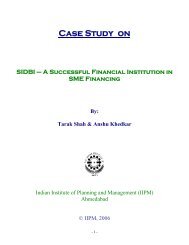
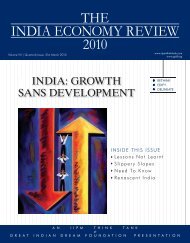
![[Feb 2008, Volume V Annual Issue] Pdf File size - The IIPM Think Tank](https://img.yumpu.com/43961117/1/190x245/feb-2008-volume-v-annual-issue-pdf-file-size-the-iipm-think-tank.jpg?quality=85)
![[June 2008, Volume V Quarterly Issue] Pdf File size - The IIPM Think ...](https://img.yumpu.com/41693247/1/190x245/june-2008-volume-v-quarterly-issue-pdf-file-size-the-iipm-think-.jpg?quality=85)


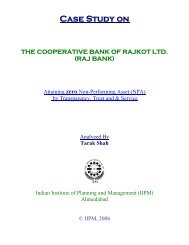

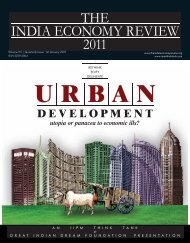
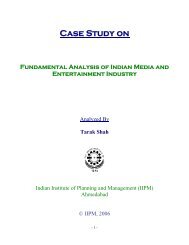
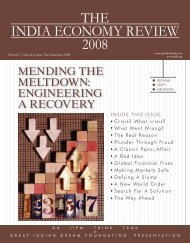
![[Dec 2007, Volume 4 Quarterly Issue] Pdf File size - The IIPM Think ...](https://img.yumpu.com/29766298/1/190x245/dec-2007-volume-4-quarterly-issue-pdf-file-size-the-iipm-think-.jpg?quality=85)
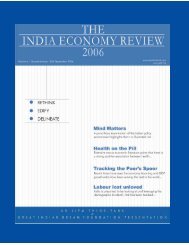
![[Volume VI | Quarterly Issue: 31st May 2009] Pdf File size](https://img.yumpu.com/27796051/1/190x245/volume-vi-quarterly-issue-31st-may-2009-pdf-file-size.jpg?quality=85)